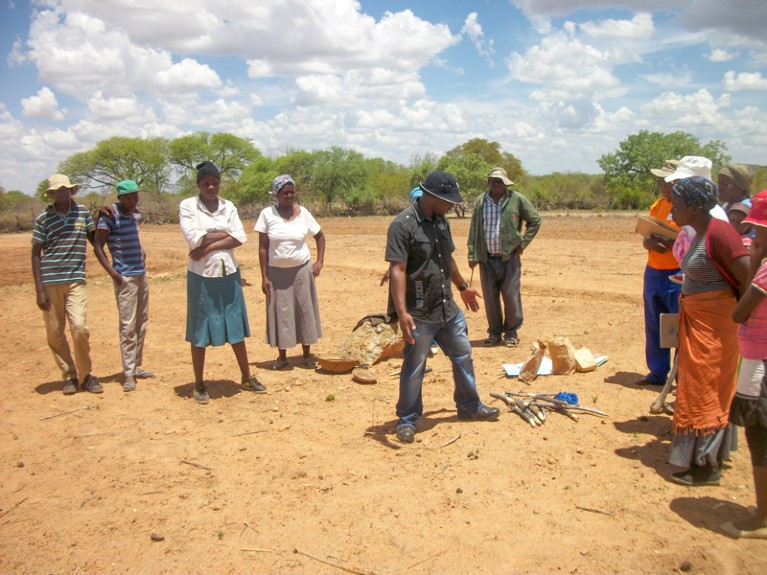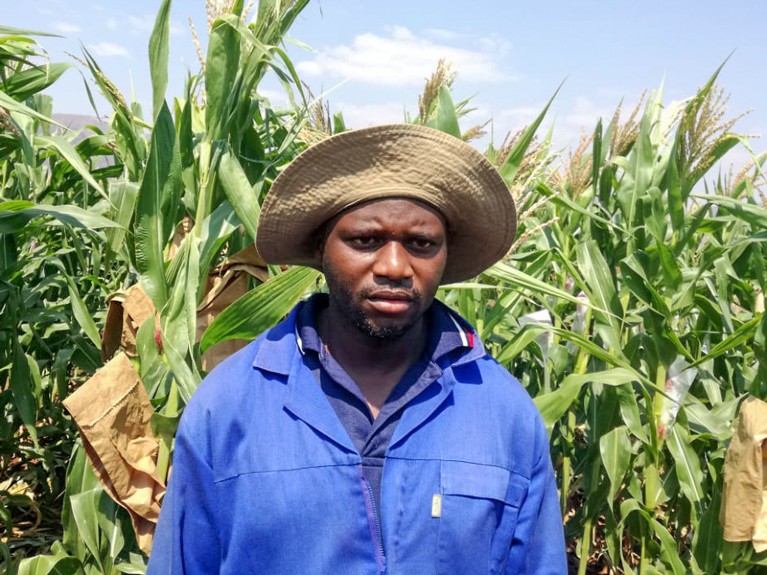
Plant geneticist Prince Matova (centre, dark shirt) demonstrates how to lay out trials of new crop varieties for dryland farmers in Matabeleland South in Zimbabwe.Credit: Prince Matova
Ever since he began his studies at the University of Zimbabwe in Harare in 2002, Prince Matova has been fascinated by how crop breeding could feed the world in better, more sustainable ways. After graduating, he joined the Crop Breeding Institute (CBI) in Harare, part of Zimbabwe’s Department of Research and Specialist Services. At the CBI from 2006 to 2020, he worked to improve varieties of cowpea (Vigna unguiculata), a legume eaten by both humans and cattle, and of maize (corn; Zea mays). In 2014, he earned a master’s degree in crop science from the University of Zimbabwe; in 2021, he gained a PhD from the University of the Free State in Bloemfontein, South Africa, on breeding maize to resist a pest called the fall armyworm (Spodoptera frugiperda).
Since November 2020, Matova has worked for the private company Mukushi Seeds in Harare. He is currently a research and seed-production manager and lead maize and legumes breeder. Matova describes for Nature why plant breeding is like expecting a birth, and how he has worked with farmers to bring them into the research process and improve food security.
What drew you to plant breeding and how have you worked with farmers to improve it?
While studying crop science at university, I became fascinated with genetics and plant breeding, and that oriented me towards agriculture. Over the years, I developed a passion for plant breeding and I realized it has immense potential to improve people’s lives in countless ways. To me, breeding is like having a baby; the birth expectation and the joy of watching them grow is amazing. Now, the interesting part with breeding is that you have the free will to choose and discard traits and direct selection where it is needed. That alone is so exciting, and breeding gives you a chance to make a significant contribution to the survival and evolution of humanity.

Prince Matova has encouraged farmers to get involved in the early stages of developing drought-resistant crop varieties with enhanced nutritional value.Credit: Prince Matova
One of my proudest achievements in the industry is encouraging more farmer involvement in variety development. For farmers to realize value from breeding products, they should be involved in the process of developing and selecting varieties. We used to engage farmers only at the tail end of the process — in other words, during on-farm testing, which is when we assess the farmer’s acceptance of the variety targeted for release. Now, we are making efforts to strongly involve farmers in defining what they want in a variety.
What advances have you made?
Working with farmers across Zimbabwe, I trained them to conduct on-farm trials of seed products, and to produce and maintain seeds from self-pollinating crop varieties, mainly legumes, on the farm. Furthermore, with international agencies such as the International Atomic Energy Agency (IAEA), the Food and Agriculture Organization of the United Nations and non-governmental organizations including UK-based Practical Action and the National Genebank of Zimbabwe, along with the CBI, my team and I introduced more than a dozen elite cowpea varieties into various farmer communities and released Zimbabwe’s first cowpea mutant variety. This was bred using irradiation to introduce mutations; it is drought tolerant and has helped farmers to cope with the effects of climate change, increasing yields by up to 20%. Also, working in collaboration with the International Maize and Wheat Improvement Center in Texcoco, Mexico, we released four orange maize varieties with high β-carotene content, which helps to boost vitamin A.
How will these products affect farming in Africa?
I helped to develop and release four cowpea varieties that are currently being cultivated in Zimbabwe and nearby countries. These varieties are high-yielding, nutritious and drought-tolerant.
Farmers in low-rainfall areas have benefited from these varieties because they contribute to food security as well as increased income through the sale of grain and seed. For example, I have trained farmers in Matabeleland, a drought-prone southern province of Zimbabwe, to produce and maintain cowpea and another legume, the Bambara groundnut (Vigna subterranea), as sustainable crops.
You worked for seven years before pursuing your master’s degree and PhD — what motivated you to advance your studies?
I started working soon after university because I wanted to give my parents a well-deserved break; they had done so much for me. During those early years, I managed to gain practical experience in breeding and seed systems, but I lacked a deeper understanding and critical thinking about the subjects involved.
Working with PhD scientists, I could see how deeply they understood their work, and this motivated me to pursue further studies.
You have worked for both government agencies and private companies. How are those research environments different?
Private companies prioritize and value research and development (R&D) because it is what makes them more competitive. Their investment in R&D makes work very interesting and keeps my curiosity and passion lubricated and high.
Mukushi Seeds’ research and agronomy department is expanding from predominantly focusing on maize to the breeding and agronomy of other crops, including soya bean, traditional grains (sorghum and millets), sugar bean, cowpea, sunflower and groundnuts.
What do you think is most important when mentoring young scientists in agricultural research?
After I had successful collaborations and training with the IAEA, some of their technical and project-management officers recognized my expertise and hired me to train international scientists and research fellows.
Training young scientists is the only way we can maintain the legacy of the plant-breeding practice. Young scientists are the drivers of breeding in the future. Young people need to understand that it is important to be focused, passionate and ethical.
Zimbabwe is in economic turmoil, with one of the highest inflation rates in the world. Do you see yourself leaving the country?
I love my country and I like to maintain its heritage. I have been all over Africa and to several countries in Europe. It is very nice in some of these countries, but I am still here. My major drive is the desire to make a significant contribution to agriculture in Zimbabwe.

 Biotechnologist’s long-life bananas unite business and social solutions
Biotechnologist’s long-life bananas unite business and social solutions
 Leveraging my training in space medicine for technological innovation
Leveraging my training in space medicine for technological innovation
 Harmony on the farm: integrating crops, trees, goats and bees
Harmony on the farm: integrating crops, trees, goats and bees







